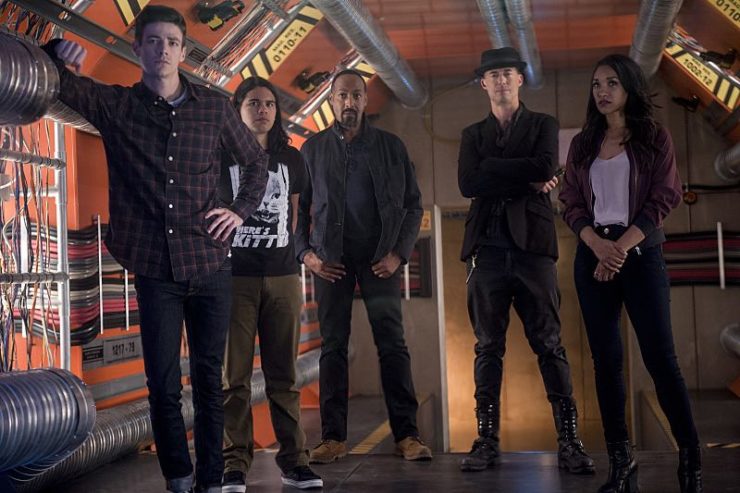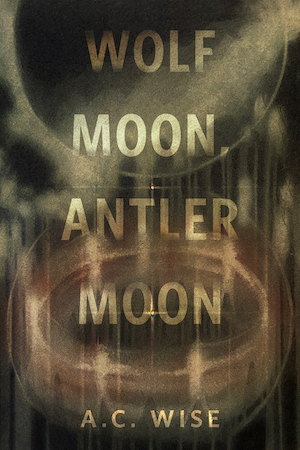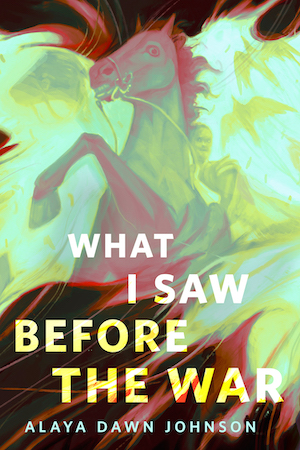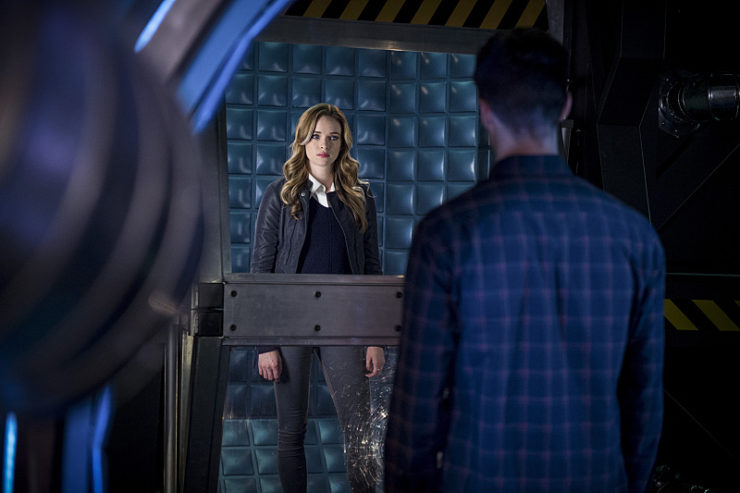Since neither Arrow or Legends of Tomorrow aired this week, The Flash gets all the attention! With more speedsters, more underused Iris, and more emotional drama, “Killer Frost” is a mixed bag. Despite a couple of excellent performances, it highlights how the show is struggling with its once-bright(ish) tone.
Spoilers for the episode below!
I try to look at Flash as the show it is, not the show I think it could or should be—but that’s been fairly difficult this season, as the show itself seems unsure about its core nature. The Flash started out as the fun, playful, cheerful companion to Arrow’s growly darkness, and it worked, for a time. But as the stakes ramped up, the story grew heavier; you can’t just be dashing around having a meta-good time when the fate of the world is literally at stake. It’s not easy to balance high stakes with humor and heart, but at its best, The Flash does just that—in large part thanks to Grant Gustin, who really sells Barry Allen’s earnest, do-gooder heart even when Barry screws up.
Last season’s finale and this season’s premiere, though, put a heavy strain on the show by asking us to consider the other side of Barry Allen. These are pretty typical superhero questions: What are the consequences of your actions? Are they worth it? Who are you to decide who’s good and evil? But it’s complicated to apply these questions to a character whose other power is, as H.R. Wells put it this week, hope. Barry’s power is his idealism, his certainty that things will turn out all right—and that’s exactly what got them into their current mess in the first place. Barry’s so sure things will come out ok that he doesn’t think things through, and now everyone’s living in a world that’s the direct result of his presumptuousness.
How do you maintain, or return to, a bright superpowered tone when your fresh-faced hero screwed up everyone’s lives? That’s the struggle of season three, which hasn’t quite found its footing. And now it’s introduced another even-faster-than-Barry villain, Savitar, the so-called god of speed. (I’m going to assume this is just some megalomaniacal posturing, as I don’t see there being a god of cold or god of controlling bees—though given the existence of the speed force, there’s obviously something different about speedsters than other metas.)
When The Flash struggles, its characters begin to feel like plot devices. Savitar shows up for his own reasons, but his presence forces Caitlin’s hand: She has to use her powers to save Barry from the giant metal-robot-god-creature, which zips around the city at previously unimaginable speeds. H.R. says random things that just happen to be extremely accurate and/or useful. And Caitlin, despite all her extra screen time, essentially winds up right where she begins: having given Barry a chance to use his power-of-hope for good, she goes back to being unable to safely use her powers.

Caitlin’s fear of becoming Killer Frost is grounded in more things than the show has time to address. She’s experienced a lot of loss and trauma as a result of metahumans, and everything seems (inexplicably) to be conspiring to turn her into the evil version of herself. Still, it’s frustrating that she never considers whether she could turn her powers to good—and even more frustrating that the show almost seems to be suggesting that the powers turn her evil. Is there precedent for this? Should we think that Frankie’s awakened powers turned her into mean Magenta? Is this how metahumans work in this timeline? Why does Alchemy have plans for Caitlin when we’ve seen no sign that her powers have anything to do with him?
Killer Frost’s instant nastiness just doesn’t ring true, though it could have if the writers had better centered Caitlin’s anger in her own loss. Danielle Panabaker does an excellent job of giving us a hurting, scared Frost, especially when she takes a long moment to remind Barry of his many mistakes. She’s right, and we all know it (though we’d probably be a little gentler in saying so). But because the reminder comes from Killer Frost, and not from Caitlin, the scene primarily serves to remind us what a kind, good heart Barry has when he forgives Caitlin for being Frosty. Who really needs forgiveness here? Who’s having a redemptive moment? How many mistakes can be swept away with a good hug?
In the process of Caitlin’s cold-hearted tirade and the resulting hugging-it-out moment, Cisco finds out that it’s Barry’s fault his brother is dead, and Carlos Valdes knocks it out of the park playing the one character who has really, really mixed feelings about Barry as a result. Caitlin also proves that she doesn’t have to be evil—but the show still puts the power-dampening cuffs back on her wrists by the episode’s end. With Jesse Quick back on her own Earth, Caitlin’s the only female member of the team with powers—powers that can only allowed out of their box, so to speak, when Barry needs them. This plot might still go in a different direction, but right now I am eyeing it with a very skeptical face.
Meanwhile, Wally West gets his wish, and is now a speedster who can run even faster than Barry could when he first got his powers. Wally seems like himself—an even happier version of himself—but since he just hatched out of a glowing rock cocoon, this is likely to go sideways. Iris once again has little to do beyond reiterating her support for Barry, who says again that there’s no Flash without her, which feels like heavy foreshadowing. Much as I hate to say it, Iris’s relationship with nice guy Eddie was more believable. But Iris did get to make one important point: They’ve no way of knowing if all the things that are different in this timeline might’ve happened anyway. Barry changed the world, but he doesn’t control it.
“Killer Frost” ends with what appears to be the least surprising reveal ever: Julian and the Alchemy hood. There has to be something else going on there, whether a missing piece of Julian’s background, a secret about his intentions, or another surprise entirely. I liked the straightforwardness of Julian’s little speech to Barry when he demands Barry’s resignation in exchange for protecting Caitlin; from where he’s standing, Barry looks like an irresponsible mess. What will quitting his job mean for Barry (and who pays for STAR Labs these days)? Can the show be about superhero introspection and get back to its lighter nature at the same time? Everyone make mistakes, but if superpowers make your mistakes bigger, how do you deal with that? And where the heck did Greg Grunberg come from?
Molly Templeton is still trying to decide whether season 3 Flash is comparable to season 7 Buffy, at least in terms of our fearless leaders making painful mistakes. (Not that Barry’s going to open a Hellmouth or anything.)










